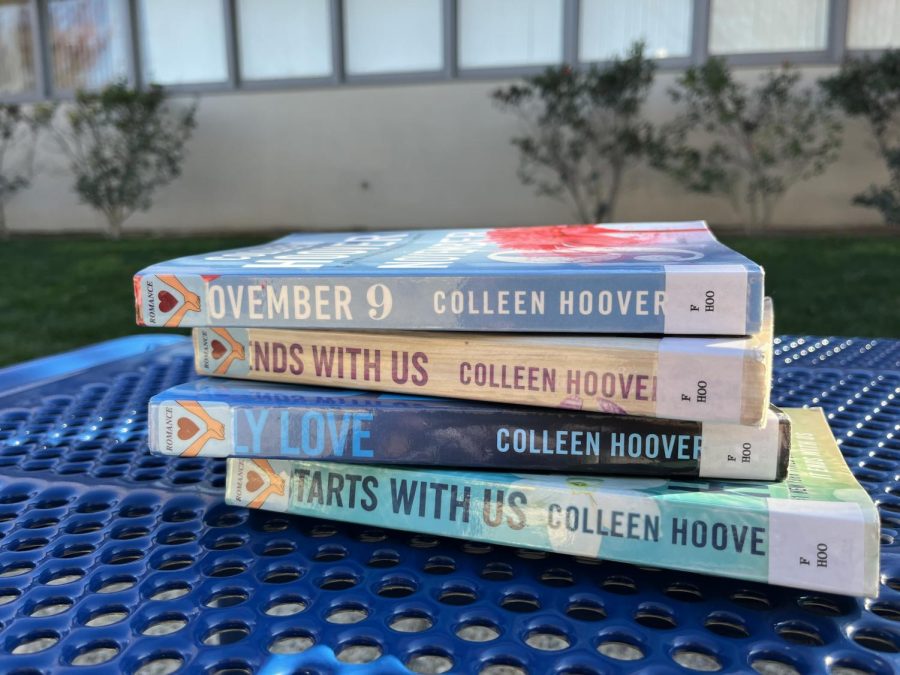Opinion: I read Colleen Hoover’s books so you don’t have to (and you shouldn’t)
This photo shows a couple books written by Colleen Hoover. Her “romance” books rose to popularity, however, the love stories romanticizes misogynistic themes and toxic behavior.
Spoilers for Colleen Hoover’s books “November 9” and “It Ends With Us”.
The formula for a romance novel is pretty straightforward: the female lead meets the male lead in an interesting situation. They are both conventionally attractive in some way, and strong emotions — anger, love, passion — fly. Something stops them from being together. They ultimately overcome that obstacle to be together, and all is right in the world again.
Author Colleen Hoover breaks that mold, turning romance tropes on their head, and achieving virality on TikTok and Instagram. Hoover sold 8.6 million print books in 2022, outselling even the Bible. Her most popular book, “It Ends With Us,” is getting a movie adaptation starring Blake Lively and Justin Baldoni.
But now, the backlash against her is growing, with claims that she romanticizes abuse and includes deeply misogynistic themes in her books. A quick examination of her novels confirms this to be true.
In her novel, “November 9,” the female lead, physically scarred from a house fire, meets the male lead every year on November 9th and they start an intimate relationship where he fetishizes her scars. Then the female lead realizes that he had set the fire that caused her scars, but ultimately forgives him after realizing that he has more trauma which somehow justifies his actions. The novel ends with their reunion and a shared kiss.
In her most popular novel, “It Ends With Us,” the female lead grew up with an abusive father, and the male lead accidentally shot his brother as a toddler. They get married and are blissfully happy until the male lead gets jealous of the female lead’s childhood love interest and starts abusing her, but apologizes and gaslights her after every incident. Eventually, she leaves him, finds out she’s pregnant, and divorces him but continues to co-parent with him.
The main problem is that her books are marketed as a romance, but they’re not. Even if romance novels don’t necessarily have a happy ending, they need to be centered around love. Hoover’s books are about many things, but love is usually not the central theme.
Her character’s simply lack depth. They only exist as a product of their trauma. Especially the women, Hoover’s characters lack initiative, becoming passive members of their own story. If you remove their names, they could be copied and pasted into her different books.
The male lead is strong and possessive with trauma that makes the reader go “I can fix him,” and the girl is traumatized but her trauma only makes her more beautiful and alluring.
This becomes more evident when Hoover writes about characters supposedly in love. In “November 9”, the male lead thinks to himself that “I’ve never wanted to use physical force on a girl before, but I want to push her to the ground and hold her there until the cab drives away.” Later in the novel, the female lead tells the male lead to stop when they’re about to have sex, and he says “I’m trying. Ask me again.”
Hoover ends up commodifying serious issues for shock value, glossing over the reality of trauma in order to deliver a more palatable package. She doesn’t outright support domestic abuse or sexual assault, but the lack of strong condemnation for many of these issues contributes to the culture of condoning or even romanticizing toxic relationships.
That’s not to say Hoover’s books have no value or that no one should read them. History goes to show the perils of censorship. Hoover’s popularity is actually very understandable. She plays into tropes like childhood friends or meet-cutes and subverts them in an unexpected way, which is why so many people enjoy her books — they’re able to feel satisfied from the inclusion of family tropes while still feeling like they’re consuming something fresh and different from the generic romance. Many readers use her writing to pull themselves out of a reading slump, as her prose is simple and action-packed, perfect for an easy read.
As such, the conversation shouldn’t shift to criticism of her readers. Just because people read her books about trauma and bad role models for entertainment, it doesn’t mean they are supporting abuse.
But in Hoover’s case, she’s irresponsible with the platform she’s been given, choosing to reduce characters down to their trauma because that’s what sells. She even planned to release a coloring book for “It Ends With Us”, which was eventually canceled following outrage of her tone-deaf approach to discussing domestic violence.
Domestic abuse is real, sexual assault is real and suicide is real. Hoover’s characters may not be real, but the themes she talks about have consequences. Art influences the real-world. Especially when a large part of her fanbase are young teenage girls, the representation of love and relationships that they are exposed to matters. Hoover is responsible for the content she publishes, and she either needs to make it clear that the relationships she describes are toxic, or she needs to move them out of the romance section.
Rape is not romantic. Women are not defined by their abuse. Trauma doesn’t excuse violence. This is what teens should be learning from the books they read, not to excuse toxicity and mistreatment. Colleen Hoover isn’t romantic, let’s stop treating her books as romance.






Debbie | Dec 21, 2024 at 8:05 am
Completely & totally agree!
fio | May 18, 2023 at 2:19 am
Hi Audrey, I just wanted to say, ‘thank you’. I have been looking for articles like this and it was impossible to find. People seemed to applause everything that Colleen Hoover writes and I’m sick of that.